Some links on this page are affiliate links. This means we may earn a commission at no additional cost to you if you click through and make a purchase, you can check our Affiliate Disclosure. Thank you for your support!
Embracing Eco-Friendly Kitchen Habits 🌱– Welcome to the green side of life, where your kitchen habits can make a real difference! Switching up your routine to include eco-friendly kitchen habits isn’t just good for the earth; it’s a powerful statement about the world you want to live in. Let’s dive into why these habits matter and how they can bring joy to your cooking space.
Why Eco-Friendly Kitchen Habits Are Vital for Our Planet
The planet gives us all the ingredients we need for a delicious life, so it’s only fair we look after it, right? Here’s the scoop:
- Reduce Waste: By adopting eco-friendly kitchen habits, you can help cut down on the massive amount of food and packaging waste in landfills each year.
- Save Resources: Simple changes, like using less water or energy, mean big savings on natural resources.
- Protect Ecosystems: When you choose sustainable products, you support farming and production methods that are kinder to wildlife and ecosystems.
Every eco-friendly choice you make in the kitchen sends a ripple through the environment. It’s like voting for a cleaner planet with every meal you prepare!
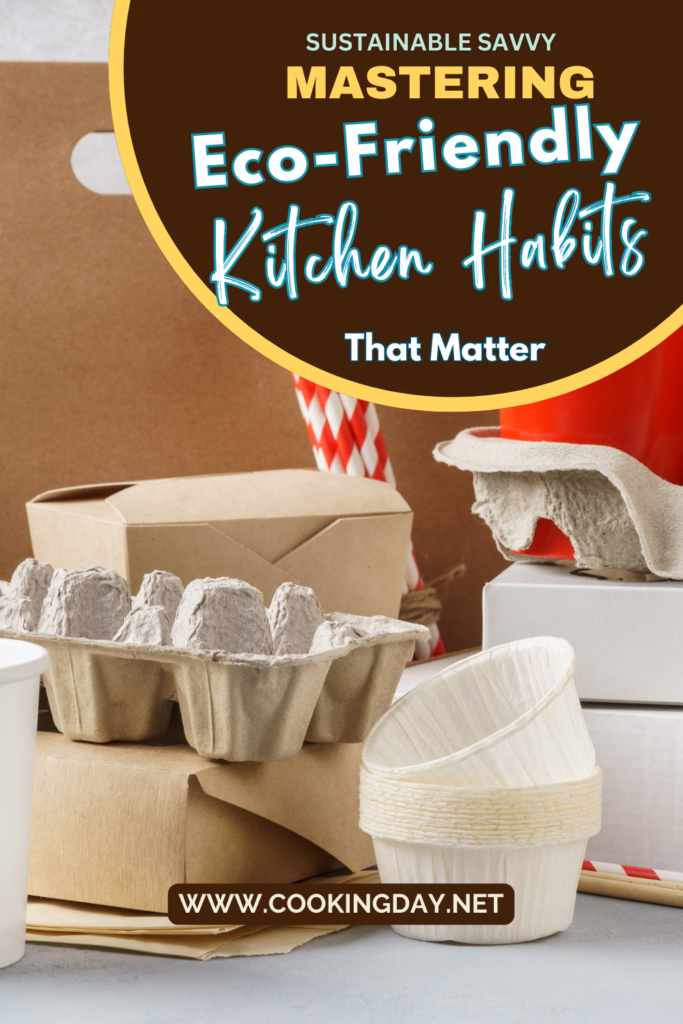
The Joy of Crafting a Sustainable Kitchen Space
Creating an eco-friendly kitchen is not just about responsibility; it’s about joy and creativity. Here’s how it adds a sprinkle of happiness to your life:
- Better Living Space: Because eco-friendly kitchens use fewer harmful chemicals, you and your family will live in a healthier environment.
- Mindfulness and Connection: When you know where your food and kitchen tools come from, you create a deeper connection to your food and the world around you.
- Creativity Boost: Finding new ways to reuse, recycle, and reduce opens up a new world of culinary creativity. Who knew that repurposed glass jars could make such chic storage solutions?
So, ready to spice up your kitchen life the eco-friendly way? Keep these thoughts in mind as we explore the ins and outs of green kitchen habits. Let’s make every meal a step towards a healthier planet! 🍽️🌍
Understanding the Basics of Eco-Friendly Kitchen Habits 🍳
Diving into eco-friendly kitchen habits is like learning a new recipe – it’s all about combining the right ingredients to create something unique. But instead of a tasty dish, you’re creating a better future for our planet. Let’s get into the nitty-gritty of these habits and why your kitchen is the perfect place to start.
What Are Eco-Friendly Kitchen Habits?
Eco-friendly kitchen habits are all about making choices that are kinder to the earth while you whip up your favorite dishes. Here’s a quick list to get you started:
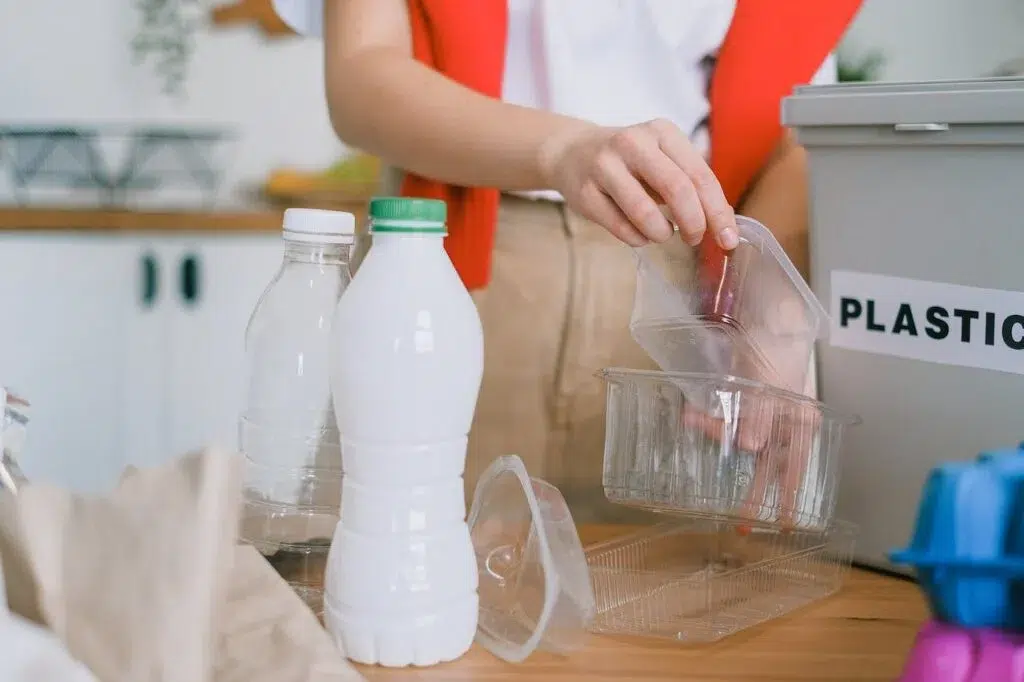
- Say No to Waste: Always think twice before you toss anything out. Can you reuse that pasta water for your plants? How about turning those veggie scraps into a homemade stock?
- Shop Smart: Go for local and organic groceries whenever possible. And remember your reusable bags!
- Efficient Energy Use: Love your leftovers – cooking in batches saves energy. Also, keep that oven door closed until your food is ready!
- Conserve Water: Turn off the tap while scrubbing those dishes. Better yet, fill up a basin to wash and rinse.
- Ditch the Plastic: Swap plastic wraps and containers for beeswax wraps and glass jars. They look better and last longer!
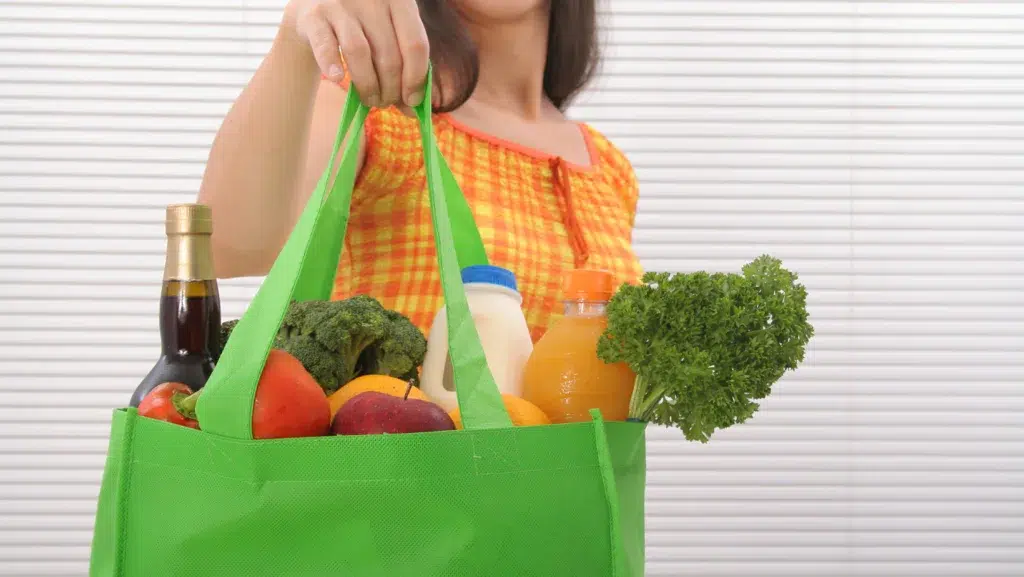
These habits aren’t just good for the environment; they’re also a great way to spice up your kitchen routine.
ALSO READ: Ignite Your Kitchen Confidence With Kitchen Safety Essentials
The Impact of Your Kitchen on the Environment
Your kitchen is the heart of your home and, believe it or not, a significant player in your environmental footprint. Every choice you make, from the energy used to cook to the products you clean with, affects the world around us. Here’s how:
- Energy Consumption: Kitchens often use a lot of electricity and gas – think about your stove, oven, fridge, and dishwasher. Opting for energy-efficient appliances and mindful use can seriously reduce your usage.
- Waste Production: The average household throws out a ton of food and packaging waste. By composting and recycling, you can help reduce this waste massively.
- Water Usage: Kitchens are also thirsty places. From washing veggies to boiling pasta, you use water in so many ways. By using it wisely, you save a precious resource and help keep our rivers and oceans cleaner.
Every time you make an eco-friendly swap or choose a sustainable option, you make a positive impact. So, let’s roll up our sleeves and turn those eco-friendly kitchen habits into daily practices. Your kitchen will not only be a hub for delicious meals but also a beacon of sustainability. 🌟
Getting Started with Eco-Friendly Kitchen Habits 🏁
So you’re ready to give your kitchen a green makeover? Brilliant! Getting started is easier than you think. It all begins with a good look at what you’re already doing and then making some tweaks here and there. Let’s break it down.
Assessing Your Current Kitchen Practices
Grab a notepad, and let’s play detective in your kitchen. Look at your daily routines and ask yourself:
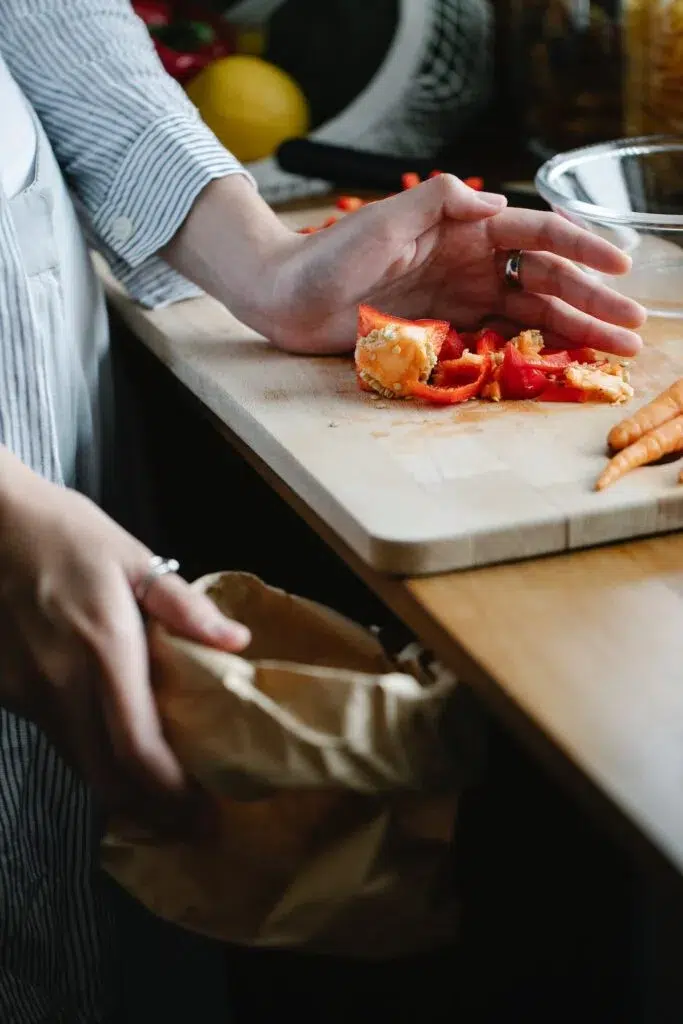
- How much food waste do I create? Take note of what you throw away.
- Do I use many disposable items like plastic wrap or paper towels? Write down every single-use thing that passes through your kitchen.
- What’s the deal with my appliances? Check if they’re energy hogs or water wasters.
- How do I shop for food? Think about the packaging that comes with your groceries.
Once you’ve got a clear picture, you can pinpoint the areas that need an eco-friendly upgrade.
Small Changes for a Big Difference
You don’t have to turn your life upside down to be more eco-friendly. It’s all about those small, daily actions that add up. Try these simple swaps:
- Ditch the disposables. Switch to reusable cloths instead of paper towels, and say hello to silicone lids instead of cling film.
- Embrace leftovers. Get creative with last night’s meal instead of tossing it out.
- Fill your dishwasher. Run it only when it’s packed to save water and energy.
- Cool it with the preheat. Many dishes don’t need a fully preheated oven to cook perfectly.
- Seal it tight. Make sure your fridge and freezer are well-sealed to keep the cold in and the energy use down.
Recall that progress, not perfection, is the aim here. Each small change you make is a victory for our planet. And don’t forget to celebrate your wins – every little bit helps in the race to keep our earth clean and beautiful. Let’s get those eco-friendly kitchen habits simmering! 🌟
ALSO READ: What Makes An Ideal Kitchen? Key Factors To Consider
How to Source Sustainably 🛒
Choosing what ends up in your shopping cart is a big deal. When you pick up something from a store shelf, you’re not just buying a product — you’re also buying into a way of growing, making, and shipping food. Let’s roll through the aisles with eco-friendly kitchen habits in mind.
Choosing Eco-Friendly Ingredients
The ingredients you choose can be the heroes of your sustainable kitchen. Here’s how to pick them:
- Go for Seasonal: Seasonal produce only travels a little. That means it’s fresher and has a smaller carbon footprint.
- Bulk Up: Buying in bulk cuts down on packaging. Plus, you can get just the needed amount, which helps reduce waste.
- Read the Labels: Look for certifications like Fair Trade or Rainforest Alliance to ensure your ingredients meet high environmental standards.
And remember, the most eco-friendly ingredient is the one you use up entirely, so plan those meals to make the most of what you buy.
Supporting Local and Organic Producers
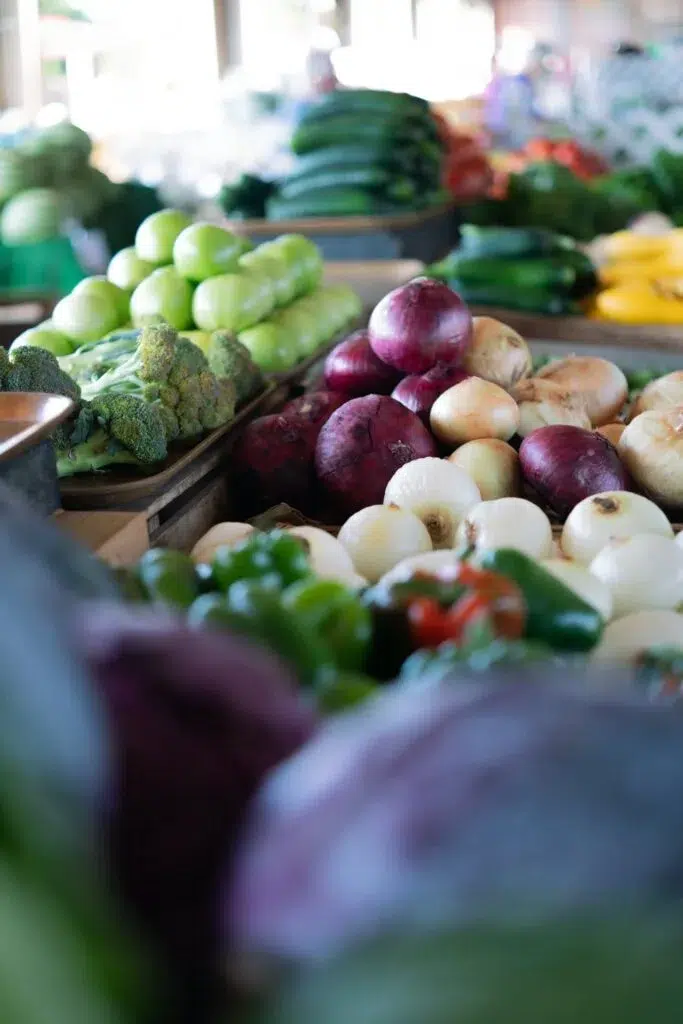
When you shop local, you’re doing more than just getting some groceries — you’re supporting your community and the environment. Here’s why it’s a win-win:
- Less Travel: Local produce doesn’t have to journey across the globe to reach your plate, which means fewer emissions.
- Seasonal Flavors: Local markets offer the freshest, most flavorful produce in season.
- Organic Matters: Organic farmers focus on sustainability and avoid using harmful pesticides that can damage the ecosystem.
So next time you’re out shopping, consider the journey your food has taken to get to you. Opt for the path that keeps things close to home, and the planet will thank you. Let’s fill those kitchen shelves with choices that feel as good as they taste! 🌿🛍️
Energy Efficiency in the Kitchen ⚡
You know, a kitchen humming with energy efficiency is like a well-oiled machine — it runs smoother and costs less in the long run. Plus, it’s a massive win for the environment. Let’s flip the switch on how to keep the heart of your home pulsing with eco-friendly energy.
Energy-Saving Appliances and How They Help
These days, eco-friendly gadgets aren’t just nice; they’re kitchen must-haves. Here’s the lowdown:
- Look for the stars: Energy Star-rated appliances can shave a significant chunk off your power bills, and they’re kinder to the planet.
- Upgrade Wisely: When it’s time for a new fridge or dishwasher, choose models that brag about their efficiency. They cost a bit more upfront, but the savings will show up monthly when you pay your utility bill.
- Keep Them Clean: Regular maintenance, like defrosting your freezer or cleaning the oven, keeps your appliances running efficiently.
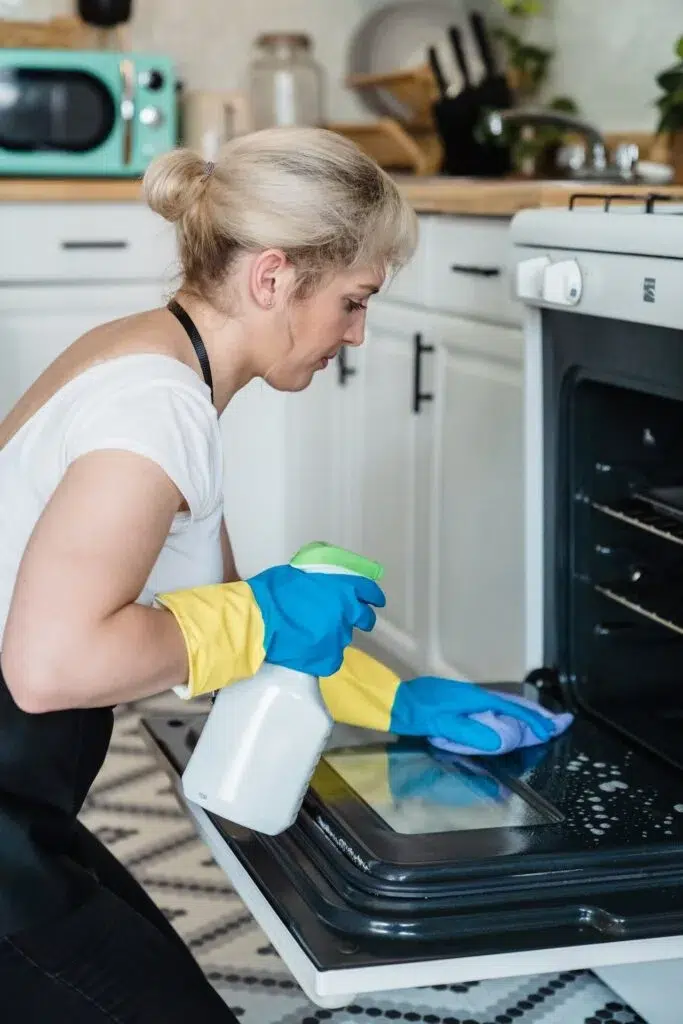
These smart appliances don’t just sit there looking pretty; they work hard to use less energy.
Best Practices for Reducing Energy Consumption While Cooking
You don’t need a bunch of fancy gadgets to cut down on energy use in the kitchen. A few smart habits can make a big difference:
- Lid on Top: Keep lids on pots to cook food faster and use less gas or electricity.
- Oven Strategy: Resist the urge to peek in the oven. Every time you open it, the temperature drops, and it has to work harder to heat back up.
- Size Matters: Match pots and pans to the burner size. Using a small pan on a large burner is like pouring energy down the drain.
- Go Natural: Use natural light whenever possible. Who doesn’t love a sunlit kitchen?
Adopting these eco-friendly kitchen habits is a piece of cake, and they’ll save you a batch of cash on your energy bills. So let’s get energy-smart and cook up some savings! 🌞💡
Waste Not, Want Not: Reducing Kitchen Waste 🗑️
Alright, let’s tackle kitchen waste. It’s all about making the most of what you’ve got and finding a new purpose for things you might toss out. Here’s how you can cut down on waste with some simple, eco-friendly kitchen habits.
Composting Kitchen Scraps
Don’t let those food scraps go to waste; give them a second life with composting. Here’s what to do:
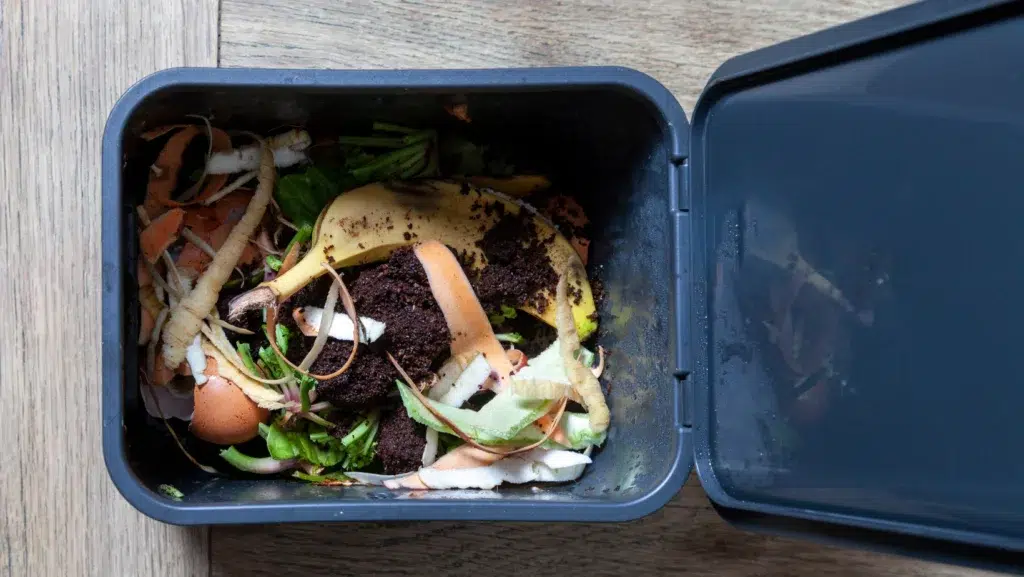
- Start a Compost Bin: You can compost fruit and vegetable peels, eggshells, and coffee grounds.
- Balancing Act: Keep your compost balanced with “greens” like veggie scraps and “browns” like dried leaves or paper.
- Turn It Over: Give your compost a good mix now and then to help it break down faster.
With composting, you’re not just reducing waste; you’re creating gold for your garden.
Upcycling Ideas for Leftover Food
Got leftovers? Check out these tasty ideas to upcycle them:
- Get Soupy: Turn yesterday’s roasted veggies into a delicious soup with just a bit of broth and some seasoning.
- Stir-Fry Magic: Toss whatever’s in the fridge into a stir-fry. Leftover rice, veggies, and that bit of chicken can make a great meal.
- Smooth Moves: Blend up fruit on the verge of being overripe into smoothies.
Leftovers can be the start of something delicious. Get creative and save food from the bin!
Plastic-Free Storage Alternatives
Replace your plastic wrap with one of these environmentally friendly alternatives:
- Bee’s Wrap: Use these reusable, washable wraps made from beeswax to cover and store food.
- Glass Jars: They’re perfect for storing everything from grains to leftovers.
- Silicone Lids: These can stretch to fit over all sorts of containers, creating an airtight seal.
Switching to sustainable storage is a small change that can have a big impact on reducing your kitchen waste. It’s all about making smarter choices that are kinder to our planet. So, let’s wrap it up sustainably and keep that waste out of the landfill! 🌎🍲
Water Wisdom: Conserving Water in the Kitchen 💧
Water is like the unsung hero of the kitchen. We use it without a second thought, but with a few tweaks to our habits, we can turn our kitchens into water-saving havens. Let’s dive into some eco-friendly kitchen habits that’ll make every drop count.
Fixing Leaks: Every Drop Counts

Leaky taps might seem harmless, but they’re like little water thieves sneaking gallons out of your home. Here’s how to stop them:
- Listen Up: Check for drips and fix leaks as soon as you spot them.
- DIY or Pro: Tighten loose valves yourself, or call in a pro if it’s beyond a quick fix.
- Regular Checks: Make it a habit to check under sinks and around appliances for any signs of leaks.
Nipping leaks in the bud saves water and can prevent bigger plumbing problems down the line.
Efficient Water Use While Cooking and Cleaning
Cooking and cleaning don’t have to be water-guzzling activities. Check out these simple tips:
- Steam, Don’t Boil: Steaming vegetables uses less water and keeps more nutrients in your food.
- Reuse Cooking Water: Let the water cool down after boiling pasta or veggies and use it to water plants.
- Soak, Don’t Scrub: Instead of running the water while you scrub, soak the pots and pans.
- Load It Right: When using a dishwasher, ensure it’s fully loaded to maximize every wash cycle.
By tweaking how you use water in the kitchen, you’re not just cutting down your utility bill, you’re also protecting our precious water resources. So let’s keep those taps tight and our water use light! 💦🍽️
Tools and Gadgets for an Eco-Friendly Kitchen 🛠️
Let’s gear up our kitchen with tools that love the Earth as much as we love cooking. It’s all about choosing items that last, waste less, and keep our kitchens running green. So, let’s stock up on some eco-friendly kitchen habits with the right tools!
Must-Have Eco-Friendly Kitchen Tools
Here’s the scoop on the tools that’ll turn your kitchen into an eco-warrior’s dream:
- Silicone Baking Mats: Say goodbye to disposable parchment paper. Silicone mats can bake batch after batch of cookies without creating waste.
- Reusable Produce Bags: Toss those plastic bags and take these washable bags to the store for your fruits and veggies.
- Stainless Steel Straws: They’re not just for sipping in style; they cut down on plastic waste, too.
- Cast Iron Cookware: Durable and non-stick without the chemicals, a well-seasoned cast iron skillet might outlive us all.
- Compost Bin: Keep it handy to turn food scraps into garden gold.
With these tools, you’re not just cooking; you’re making a statement for sustainability.
DIY Solutions for Sustainable Living
Get crafty and save some green with these DIY hacks:
- Make Your Cleaners: A bit of vinegar and baking soda can work wonders for cleaning, without the harsh chemicals.
- Grow Your Herbs: Why buy herbs when you can grow them on your windowsill? It’s fresher and cuts down on packaging.
- Bottle It Up: Reuse glass bottles as water carafes or to store homemade dressings.
When we roll up our sleeves and do it ourselves, we control what goes into our kitchen and what stays out. Plus, it’s fun and gratifying to use what we’ve made with our own hands.
Equipping your kitchen with these eco-friendly tools and embracing DIY solutions can significantly reduce waste, save money, and make your kitchen a green haven. Let’s chop, cook, and live sustainably! 🌿🥄
Engaging the Family in Eco-Friendly Practices 👨👩👧👦
Getting the whole family on board with eco-friendly kitchen habits can turn chores into fun activities and teach everyone valuable lessons about sustainability. Let’s make being eco-friendly a fun family tradition!
Fun Eco-Friendly Kitchen Activities for Kids
Kids love to get their hands dirty and try new things, so here’s how to spark their interest:
- Garden Together: Start a small herb garden. Kids will enjoy sowing seeds and seeing them sprout!
- Cook with Scraps: Show kids how to make veggie stock with leftover scraps. It’s like a tasty science experiment.
- Recycling Games: Turn sorting recyclables into a game. Who can sort the fastest?
By involving kids in these activities, you’re not just keeping them busy; you’re also instilling eco-friendly kitchen habits that will last a lifetime.
Making Eco-Friendly Kitchen Habits a Family Affair
Creating a sustainable kitchen is a team effort. Here’s how to get everyone involved:
- Assign Eco-Tasks: Give each family member an eco-responsibility, like turning off lights or managing the compost bin.
- Lead by Example: If the kids see you reusing containers and choosing sustainable options, they’ll follow suit.
- Family Cooking Nights: Once a week, cook a meal using local, seasonal ingredients.
When the family practices eco-friendly kitchen habits, it strengthens your collective commitment to a healthier planet. Plus, it’s a beautiful way to bond and create lasting memories.
Let’s make every meal a step towards a more sustainable future, with the whole family leading the charge! 🌍🍴
Conclusion: The Future is Green with Eco-Friendly Kitchen Habits 🌟
As we wrap up, remember that every small step towards eco-friendly kitchen habits can make a significant impact on our planet. We’re not just chopping veggies and cooking meals; we’re setting the stage for a healthier world. So, let’s carry these green habits forward!
Recap: Key Takeaways on Eco-Friendly Kitchen Habits
Here’s what we’ve learned together:
- Start Small: Begin with easy switches like reusable bags and water-saving techniques.
- Involve Everyone: Get the whole family on board for a fun and united approach to sustainability.
- Keep Learning: Look for new ways to improve and expand your eco-friendly practices.
Every time you opt for a sustainable choice in the kitchen, you’re voting for a greener tomorrow.
The Ongoing Journey of Sustainable Living
The journey to a fully sustainable lifestyle is ongoing. It’s a road paved with continuous learning, growth, and adjustment. Here’s how to stay on track:
- Stay Inspired: Follow eco-friendly blogs (like yours!), social media accounts, and documentaries to keep the inspiration flowing.
- Spread the Word: Share your journey and tips with friends and family. Encouragement goes both ways!
- Celebrate Progress: Don’t forget to celebrate the wins, no matter how small they might seem.
With every meal, every choice, we have the power to contribute to a sustainable future. The eco-friendly kitchen habits you’ve embraced are seeds planted today for a greener tomorrow. So let’s keep going, growing, and greening our world, one kitchen at a time! 🌱✨
FAQs: Your Questions Answered About Eco-Friendly Kitchen Habits ❓
Navigating the shift to a more sustainable lifestyle can bring up a lot of questions. Let’s tackle some of the most common queries about eco-friendly kitchen habits!
How Can I Start Implementing Eco-Friendly Kitchen Habits Today?
You can start small, but think big! Here are a few easy steps:
- Switch to Reusables: Ditch plastic wrap for beeswax wraps and swap paper towels for cloth ones.
- Mindful Shopping: Buy in bulk to reduce packaging and choose local produce.
- Energy Awareness: Use appliances efficiently—like boiling water with the lid on.
Just by doing these, you’re already making a difference!
What Are the Most Important Eco-Friendly Kitchen Habits to Adopt?
Prioritize these habits for maximum impact:
- Waste Reduction: Compost food scraps and plan meals to minimize waste.
- Sustainable Sourcing: Choose organic and locally-produced foods whenever possible.
- Conserving Resources: Save water and energy by using efficient cooking methods and appliances.
These essential habits can significantly reduce your kitchen’s carbon footprint.
How Can Eco-Friendly Kitchen Habits Save Money?
Going green can be great for your wallet! Here’s how:
- Cut Down on Utilities: Using energy-efficient appliances and fixing leaks reduces bills.
- Less Waste: Buying only what you need and storing it properly means less money thrown in the trash.
- DIY Solutions: Making your cleaners or growing herbs cuts costs on store-bought items.
Being eco-friendly often means being budget-friendly too.
Can My Eco-Friendly Kitchen Habits Make a Difference?
Absolutely! Every sustainable choice you make has a ripple effect:
- Reduced Carbon Emissions: Less energy used means fewer greenhouse gases.
- Conservation of Resources: Saving water and reducing waste preserves vital resources.
- Inspiring Others: Your actions can motivate friends and family to adopt similar habits.
Never underestimate the power of one person’s positive change—it all adds up!
By embracing eco-friendly kitchen habits, you’re not just cooking up delicious meals; you’re also serving up a healthier planet. Keep asking questions, stay curious, and let’s continue making a difference, one kitchen at a time! 🌍👩🍳

